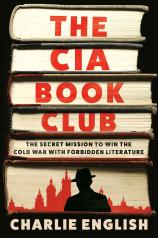The CIA Book Club: The Secret Mission to Win the Cold War with Forbidden Literature
Review
The CIA Book Club: The Secret Mission to Win the Cold War with Forbidden Literature
As the 1980s approached, the Cold War was heating up in various corners of the world with proxy battles in Afghanistan, Nicaragua and Angola. The Berlin Wall remained a formidable partition separating friends and loved ones in Germany. While the Mujahideen fought Russian soldiers in Kabul with US funds provided through Operation Cyclone, a new battlefront was about to be opened in Poland, where literature would prove significant in winning the hearts and minds of the oppressed people.
The books were smuggled in from the West and camouflaged as something as innocuous as computer manuals, but what was inside was far more valuable and enlightening to those who read them. Books such as George Orwell’s 1984 appealed to people who saw parallels to their own dreary lives as they lived under the watch of a repressive regime that answered to the Soviet Union. Western literature was forbidden in the Soviet Union and its satellite countries because of their messaging and its depictions of life under mostly capitalist regimes.
"[THE CIA BOOK CLUB is] a well-written and thoroughly researched book that will open many readers’ eyes to a once carefully hidden program of subversion. It is truly fantastic and deserves a wide audience."
The Central Intelligence Agency was emerging from a period of turmoil as the ’80s kicked into high gear. The Soviet invasion of Afghanistan had caught the CIA unaware, and they were supporting the Afghan resistance with funds that would grow to over $600 million near the war’s end. The new CIA director, William Casey, was a proponent of covert operations, and his spirit of derring-do eventually would seal his fate years down the road. The battle for control in Poland didn’t merit nearly such a response or similar funding in the CIA’s eyes, yet programs such as QRHELPFUL were initiated to wage an ideological war against Communist interests.
Money funneled through CIA cutouts like the Ford Foundation would find their way to rebels such as Miroslaw Chojecki, who operated out of Paris, and Jerzy Giedroyc, who was in London. They would utilize underground networks to divert the contraband to Poland where the books would be passed on from one reader to the next, inciting their defiant spirits. Those caught with such taboo literature risked arrest by the Security Service (SB) and an indefinite prison term, so stealth was the operative word. As the ’80s progressed and the Solidarity movement gained greater traction, the cracks in the government began to appear with greater frequency.
THE CIA BOOK CLUB is a welcome addition to the voluminous history of the Cold War. The established history of the East-West staredown tends to focus on wars (Korea, Vietnam, Afghanistan) or infamous events (the Cuban Missile Crisis). Thankfully, Charlie English sheds light on an overlooked program that sought to aid in the defeat of the Communist regime in Poland. Names like Lech Wałęsa are bandied about in the Solidarity movement, yet individuals such as the aforementioned Chojecki fall through the cracks despite their heroic sacrifices against an authoritarian regime.
English remedies this oversight with a well-written and thoroughly researched book that will open many readers’ eyes to a once carefully hidden program of subversion. It is truly fantastic and deserves a wide audience.
Reviewed by Philip Zozzaro on July 25, 2025
The CIA Book Club: The Secret Mission to Win the Cold War with Forbidden Literature
- Publication Date: July 1, 2025
- Genres: History, Nonfiction
- Hardcover: 384 pages
- Publisher: Random House
- ISBN-10: 0593447905
- ISBN-13: 9780593447901




